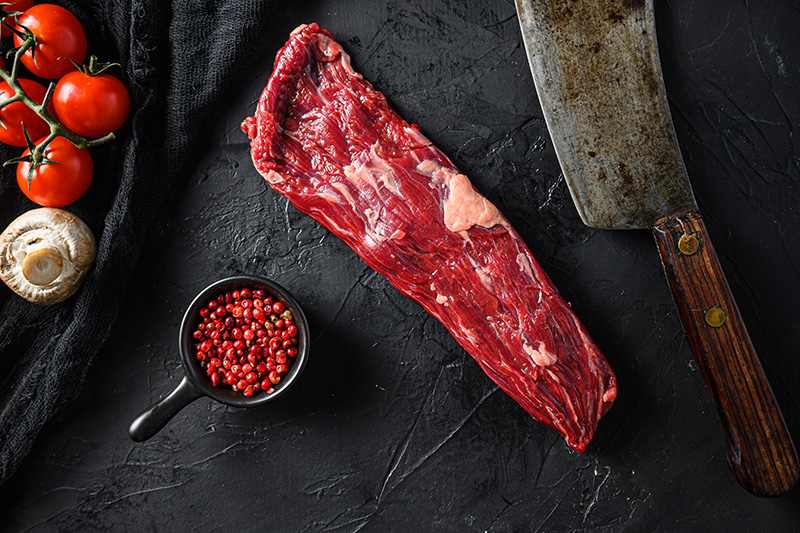More Health and Nutrition Bites
Related
When questionable research still proves something
On a few occasions I've reported on lower quality research, especially when that research has generated some media interest. I want you to know what to look for so you can better evaluate the research for yourself. On the other hand, sometimes that poor-quality research does prove something - just not what the authors thought they were proving.
Mushrooms vs. Meat
I love mushrooms. With only about 15 calories per cup, they're a good source of fiber and are also a good source of Vitamin D, selenium, and folate (especially important for women of child-bearing age). The best part? They're cheaper than the same amount of beef.
Lean, unprocessed red meat part of a heart-healthy diet - and may help with weight loss
The truth, as you know if you've been following Dr. Gourmet for a while, is that processed meats like bologna, bacon, and sausage are far greater risks to your health than lean, unprocessed red meats like beef (from cows), lamb, and pork (not 'the other white meat').
Health & Nutrition Bites
Get the latest health and diet news - along with what you can do about it - sent to your Inbox once a week. Get Dr. Gourmet's Health and Nutrition Bites sent to you via email. Sign up now!
Red meat: yeah, we knew that

A study published recently in the American Journal of Clinical Nutrition (2021;113:1126-1136) appears to show that consuming a moderate amount of lean beef, in conjunction with a Mediterranean-style diet, improved cholesterol scores significantly compared to the Average American Diet.
The authors designed three different Mediterranean-style diets, each with increasing levels of "lean beef": one that averaged 0.5 ounces per day, a second that averaged 2.5 ounces per day, and a third that averaged 5.5 ounces per day. These diets were all matched for micronutrients: each provided about 17% of calories from protein, 42% from carbohydrates, and 41% of calories from fat. They included at least 6 servings of vegetables per day and used olive oil as the main cooking fat, and were customized for each participant to provide the appropriate number of calories for them to maintain their pre-study weight and exercise routine.
Fifty-nine middle-aged men and women were randomly fed one of these diets for a four-week period, receiving all of their food from the lab, after which they returned to their usual diets for one week. This was repeated until all of the participants had followed each diet for four weeks. As a control the authors included what they dubbed an "Average American Diet" which included 52% of calories from carbohydrates, 15% from protein, and 33% of calories from fat (including 12% of calories from saturated fat).
The participants received blood tests at the start and end of each of the four 4-week diet periods.
You may be surprised to find out that two of the three variations on a Mediterranean-style diet that included various amounts of beef resulted in reduced LDL cholesterol scores: these were the patterns that included 0.5 ounces of beef/day (on average) and 2.5 ounces of beef/day (on average).
I'm not surprised, however. Because this isn't news.
To get your "less meat and leaner meats" point in a Mediterranean Diet score, you should consume less than 3.25 ounces of land animal protein (lean cuts of beef, pork, chicken, lamb, etc.) per day, on average. (That's for women. Men can consume up to 4 ounces per day, on average.)
Let's look at how much that is:
Averaging 3.25 ounces per day means up to 22.75 ounces of land animal protein per week. That's a good-sized chicken breast, an egg salad sandwich, a juicy burger, and some pork tenderloin - plus some. The participants in this study who followed a Mediterranean-style diet that included 2.5 ounces of lean beef per day (note that's less than 3.25 ounces per day) improved their cholesterol scores.
When the participants were consuming an average of 5.5 ounces of lean beef per day, their cholesterol scores did not improve over the "Average American Diet". Probably because that beef took the place of other protein sources, such as legumes, fish, and other land animal proteins.
This study, as you might have guessed, was funded by the Beef Checkoff, which is a marketing group for the Beef Board. On the home page of the Beef Checkoff's website is their purpose: "Increasing Demand for Beef." I bet they were disappointed by this research's results.
What this means for you
If the authors really wanted to discover something useful they would have been smart to include a vegetarian phase of the diet. What they've actually done is show something we already know: a moderate amount of lean animal protein, yes, including beef, is part of a Mediterranean-style diet.
First posted: July 21, 2021
